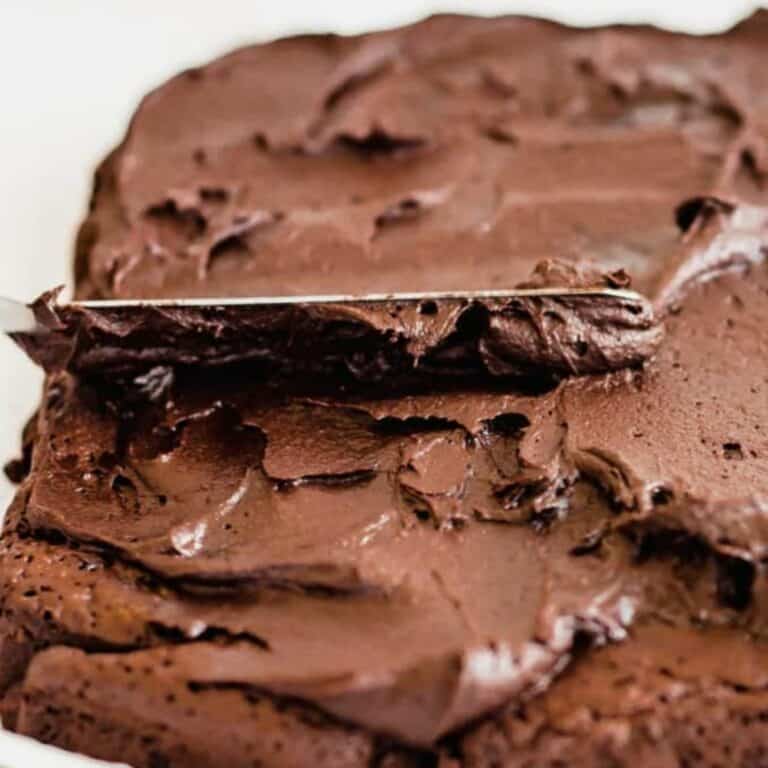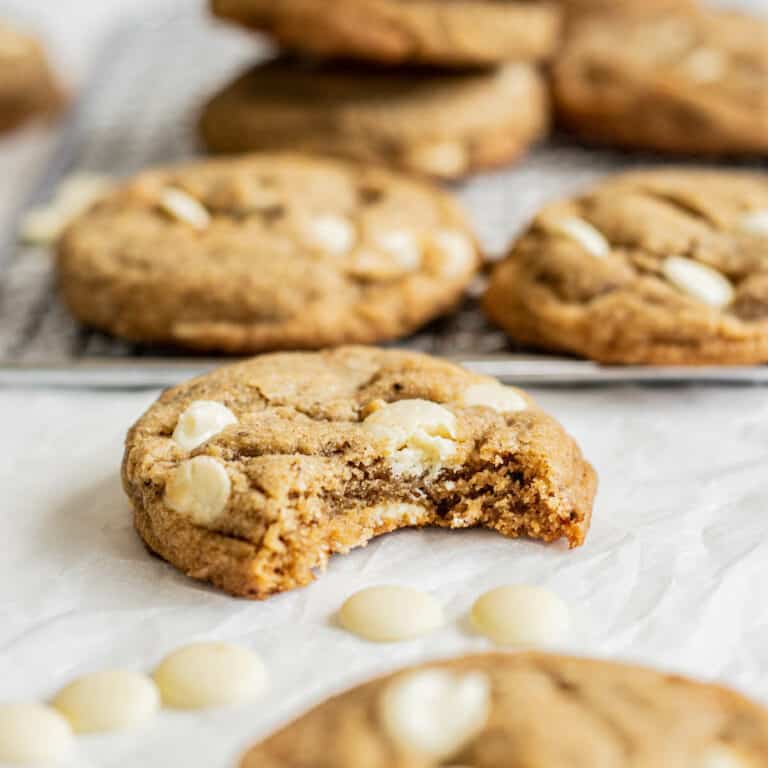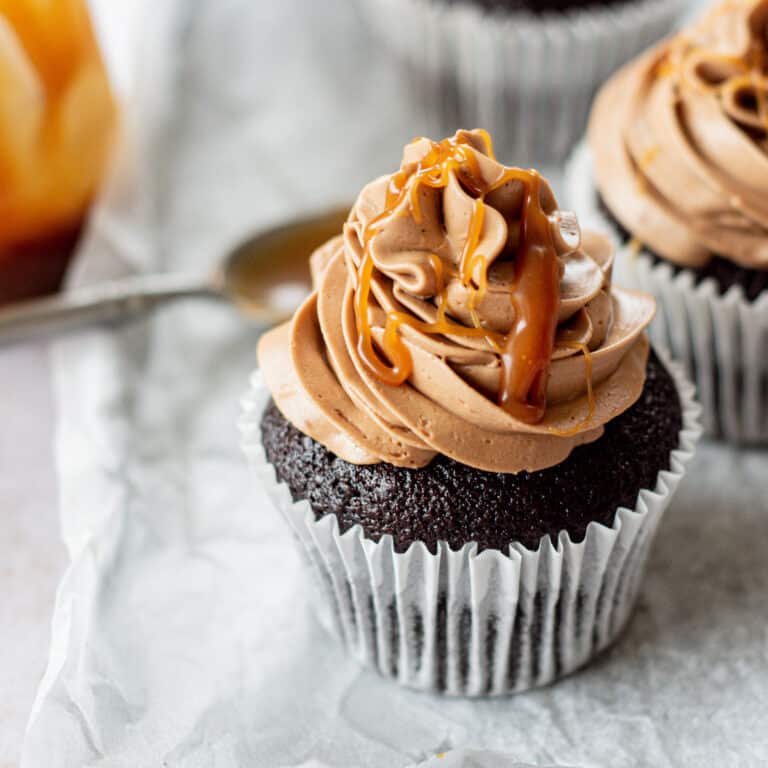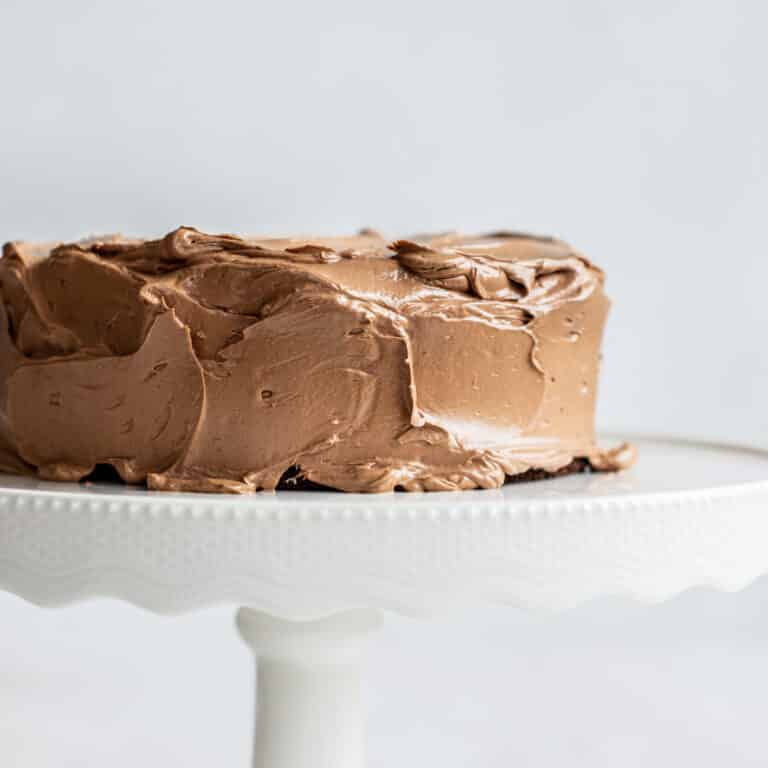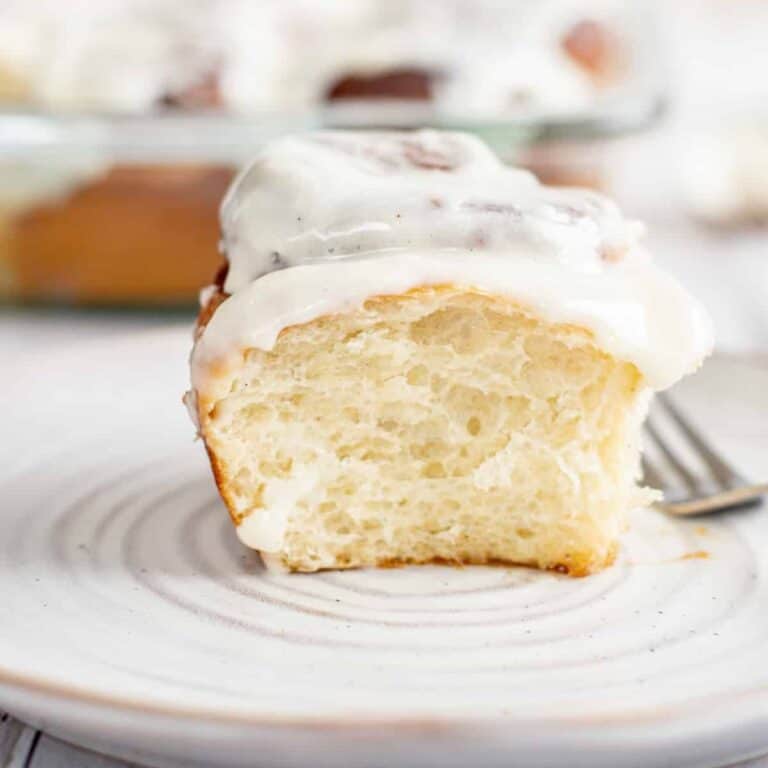How To Make Crème Mousseline
Crème mousseline, the richer relative of standard pastry cream. It’s decadent and smooth, whipped with butter. This comprehensive guide give you everything you need to create the perfect mousseline cream.

Crème mousseline is also known as German buttercream. It’s crème pâtissière enriched with whipped butter. The addition of butter results in a thicker consistency and a velvety texture.
It’s a super versatile cream too, but most known for being the filling in these classic French pastry desserts: Paris-brest (a delicious choux ring), tart Tropezienne and Fraisier cake. All three of these desserts need a pastry cream that can hold it’s shape. Since creme mousseline has so much butter, it can firm up well, especially when cooler.

Ingredients
Here’s what you’ll need for this crème mousseline recipe. Find the amounts written in the printable recipe card at the bottom of this post.
- Whole milk: The base of the crème pâtissière,
- Sugar: Granulated white sugar.
- Cornstarch: The thickener.
- Large egg yolks: Add richness and beautiful color. Save the egg whites for meringue, or make a crème chiboust!
- Vanilla: You can use a scraped vanilla pod, vanilla extract or vanilla bean paste. I really recommend using top quality vanilla for the perfect mousseline cream
- Salt: Flavor enhancer
- Unsalted butter: The butter adds more richness and texture.
Making Cream Mousseline

In a medium saucepan, heat milk and vanilla on medium heat until it is just at a simmer, but don’t let it boil.

While the milk is warming, in a separate bowl, add the egg yolks, sugar, salt and cornstarch. Whisk them together until shiny.

Once your milk is hot, add the milk mixture in a steady stream to the eggs while whisking vigorously.
Return the combined mixture to the saucepan over medium heat.
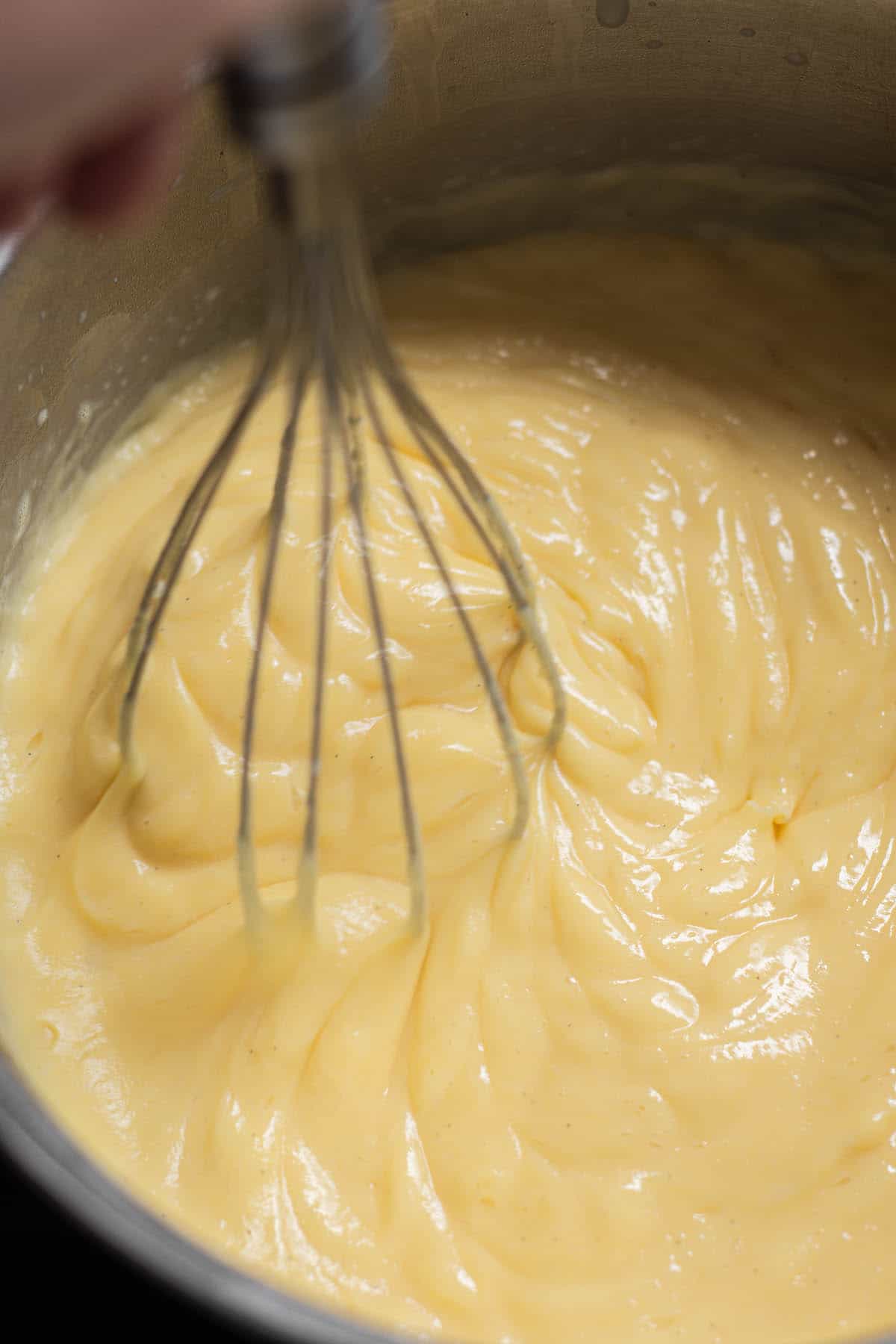
Cook the custard, whisking constantly until it starts boiling.
Let it boil for a full minute, and don’t stop whisking.
Once thick, take it off the heat and whisk in the butter until completely combined.
Pour the hot pastry cream into a clean bowl. If you want an extra silky smooth texture, you can push it through a fine mesh seive first. Lay a piece of plastic wrap directly onto the surface of the custard to avoid a skin forming and let it come to room temperature.
Your custard must be cooled to room temperature before this next step, or else you’ll melt the butter. You can refrigerate your custard until you are ready to use it too, but it must be brought too room temperature again before you use it.

Adding the butter
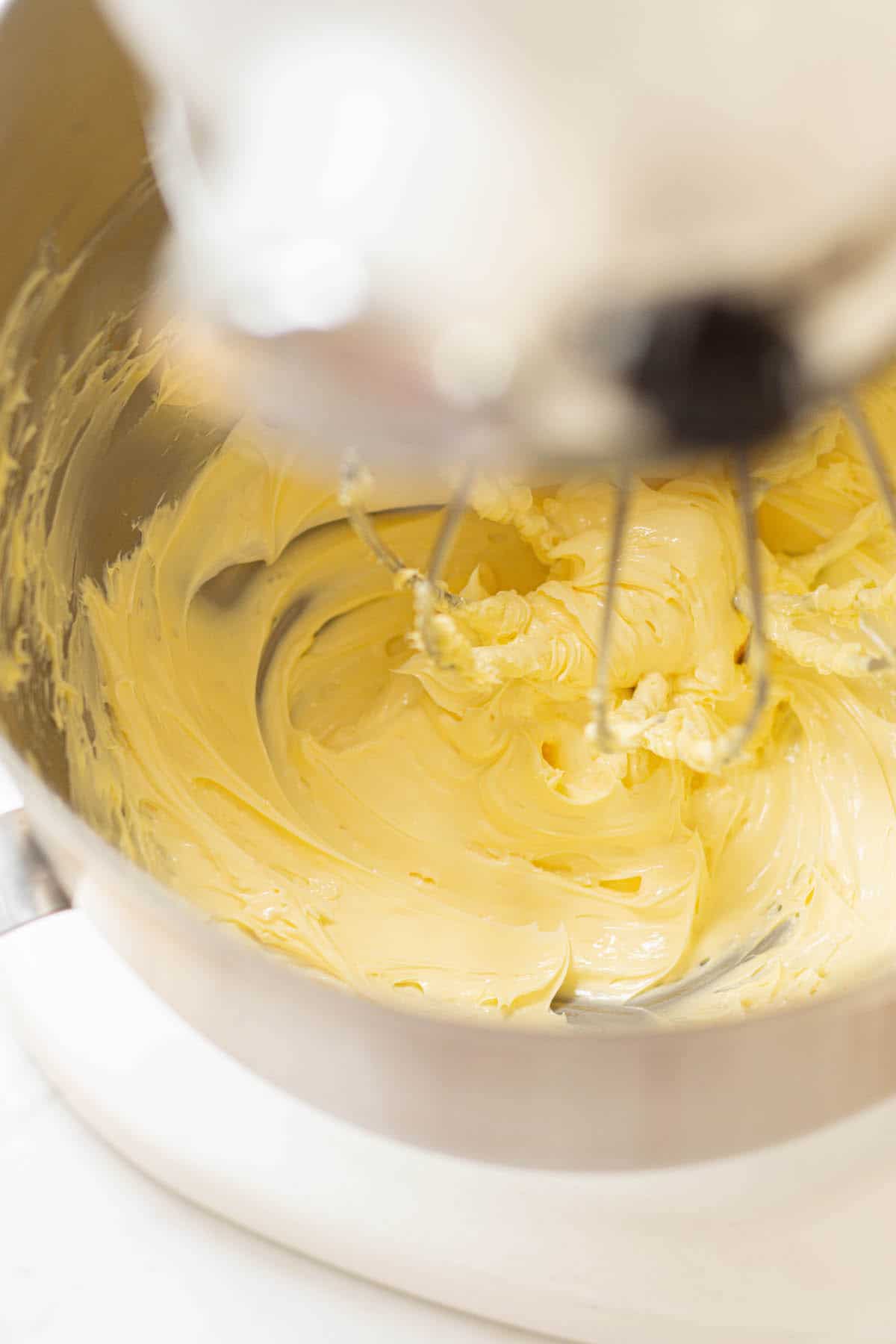
When the pastry cream is cool, beat the softened butter in a stand mixer using the whisk attachment at high speed until it’s smooth, creamy, and a lighter color.

Add the cooled pastry cream to the butter a bit at a time, whipping at medium speed until you achieve a smooth, airy mousseline cream.

If you want to use it in a piping bag and it’s a bit soft, place it in the fridge for 20-40 minutes to firm up slightly.
When your pastry cream and butter are at the right temperature, this should all go smoothly. If your cream curdles or looks grainy, read the FAQS for more information.
FAQS
This can happen if the pastry cream is too cold when added which causes the butter to get too cold and the mixture will split. To fix this, grab a couple of tablespoons of the mixture and heat it in the microwave. Add this back to the mixture and beat it again until smooth. Alternatively, warm the whole bowl of cream gently over a hot water bath for a few seconds until the edges just begin to melt. Then whip it until creamy.
It’s likely too warm. To fix this it needs to cool down. Refrigerate the bowl of custard for around 30-60 minutes (depending on how soupy it was) until the edges of in the bowl harden up. Then whip it again.
It should be stored in an airtight container in the refrigerator and used within 2 days for the best quality. Do note that it will harden in the fridge. Bring the chilled mixture back to to room temperature and whip it again before using.
I don’t recommend freezing it. If you do, it takes a little bit of work to bring it back to life and the texture can affected by freezing. Sometimes the custard can become soupy even when chilled. If you do freeze it, thaw it to room temperature and whip it. If the mixture splits, warm up a tablespoon or two, and add it back in while whipping.
Yup, you can make reductions or increase it according to taste.
Absolutely! You can flavor it with vanilla, chocolate, fruit purees, praline paste, or liqueurs. Mix in your flavoring of choice after the cream has been fully combined. If you’re adding additions that with high moisture like purees and liqueurs, it will loosen the cream up. Don’t add too much. If it gets too soft, place it in the fridge for 20-40 minutes to firm it up before using.
Uses for crème mousseline
Here are some delicious ways to use this mousseline cream.
- Layer cake filling: It’s perfect for filling sponge and layer cakes due to its rich and sturdy consistency.
- Fraisier cake: A classic French strawberry cake that uses crème mousseline as its main filling between layers of sponge cake and fresh strawberries.
- Tart filling: It can be used as a decadent filling for fruit and custard tarts.
- Choux pastry filling: Ideal as a light yet rich filling for éclairs, choux buns, cream puffs and and other choux pastry creations.
- Piping: It holds its shape well, making it suitable for decorative piping on cakes and pastries.
- Cupcake frosting: Used as a less sweet alternative to traditional buttercream for frosting cupcakes. Similar to this ermine frosting!
- Between macaron shells: A dollop can be used as the filling for luxurious macarons.
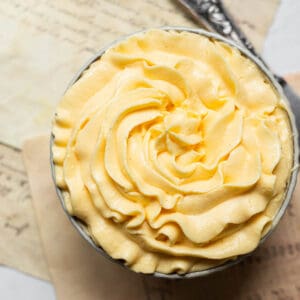
Crème Mousseline – Mousseline Cream
Ingredients
Custard
- 480 g whole milk
- 1 vanilla bean (scraped) or 2 teaspoons vanilla paste or extract
- 100 g granulated sugar
- 30 g cornstarch
- 4 large egg yolks
- 1/4 teaspoon salt
- 45 g unsalted butter
Mousseline
- 170 g unsalted butter room temperature
Instructions
- In a medium saucepan, heat milk and vanilla on medium heat until it is just at a simmer, but don't let it boil.
- While the milk is warming, in a separate bowl, add the egg yolks, sugar, salt and cornstarch. Whisk them together until shiny. Place the bowl on a dampened kitchen towel to stop it from slipping around for this next step.
- Once your milk is hot, add the milk mixture in a steady stream to the eggs while whisking vigorously.
- Return the combined mixture to the saucepan over medium heat. Cook the custard, whisking constantly until it starts boiling. Once it starts bubbling, it will begin to thicken. Keep it at a bubble don't stop whisking for 1 minute.
- Once thick, take it off the heat and whisk in the butter until completely combined.
- Pour the hot pastry cream into a clean bowl. If you want an extra silky smooth texture, you can push it through a fine mesh seive first.
- Lay a piece of plastic wrap directly onto the surface of the custard to avoid a skin forming and let it come to room temperature. Your custard must be cooled to room temperature before this next step, or else you'll melt the butter. You can refrigerate your custard until you are ready to use it too, but it must be brought too room temperature again before you use it.
The butter
- When the pastry cream is cool, beat the softened butter in a stand mixer using the whisk attachment at high speed until it's smooth, creamy, and a lighter color.
- Add the cooled pastry cream to the butter a bit at a time, whipping at medium speed until you achieve a smooth, airy mousseline cream. Once it reaches that consistency, stop mixing.
- If you find it's too soft, place it in the fridge for 20-40 minutes to firm up slightly. Don't refrigerate it too long though or the butter will harden too much. If it does become too firm, rewarm the edges of the bowl slightly over a bain marie and whip it again.
